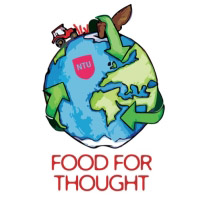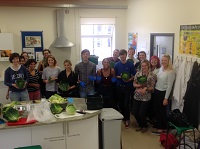Food for Thought
Education for Sustainable Development (ESD) - what is it?
Sustainable development pertains to a way of living which does not compromise the ability of future generations to live to the same standard. UNESCO's Decade of Education for Sustainable Development seeks "to integrate the values inherent in sustainable development into all aspects of learning to encourage changes in behaviour that allow for a more sustainable and just society for all" (UNESCO, 2006).
ESD aims to ensure everyone is able to acquire the skills and knowledge necessary to shape a more sustainable future.
Armed with the right knowledge and skills, NTU graduates can be capable of contributing to a better world. NTU is committed to sending students out into the world as global citizens, who are sustainability literate and have an appreciation of social and cultural diversity.
The Education for Sustainable Development: Future Thinking Learning Room
The Green Academy developed the Future Thinking Learning Room as support for staff going through the "Curriculum Refresh" process: a project that will assess all of NTU's 420 courses (both undergraduate and taught postgraduate) over a period of three years commencing in spring 2016.
All courses will need to demonstrate how they align with elements of NTU's strategic plan, of which sustainability is a key component. ESD no longer needs to be an afterthought when it comes to curriculum content, and the learning room instead allows it to be an easily achievable priority for course leaders across all academic departments. The learning room also creates a platform for dialogue with academic staff about how to best embed sustainability in the curriculum. (Please note that the learning room is only accessible to NTU staff).
NTU as a Living Laboratory
The learning room exhibits 24 newly created case studies relating to NTU-based projects that have been designed for teaching purposes. The case studies focus on both community volunteering projects and innovative environmental work happening on the NTU estate. Each of the case studies contains a short summary, contact details, and how to find out more about the project and how the project relates to the different schools and sustainable development goals. The resources are multidisciplinary and are intended for use across a wide range of courses throughout all nine schools.
NTU is one of the first universities taking part in the NUS Responsible Futures scheme, an accreditation showing commitment to sustainability learning. Please contact the Green Academy if you require further information.










